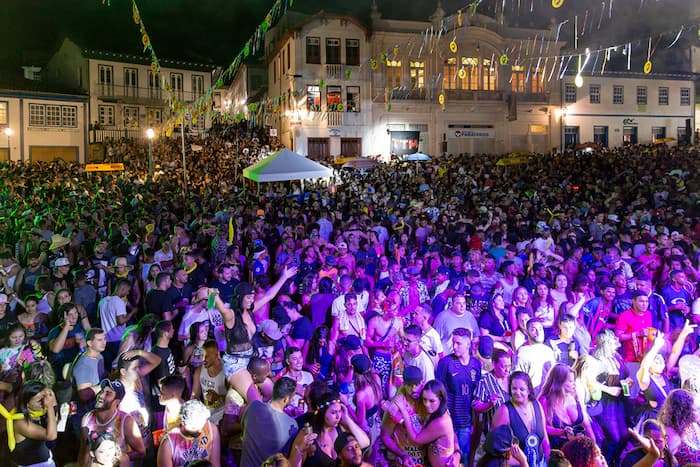Destination Stewardship Report – Summer 2023 (Volume 4, Issue 1)
This post is from the Destination Stewardship Report (Summer 2023, Volume 4, Issue 1), a publication that provides practical information and insights useful to anyone whose work or interests involve improving destination stewardship in a post-pandemic world.

Crowds flood the streets in Diamantina to join the party and dance to local samba band Bat Caverna. [Photo courtesy of Green Destinations]
Redefining Tradition: How Diamantina’s Carnival Embraced Change
Another winner from the Top 100 – Every year, Green Destinations organizes the Top 100 Destination Sustainability Stories competition, which invites submissions from around the world – a vetted collection of stories spotlighting local and regional destinations that are making progress toward sustainable management of tourism and its impacts. From the winners announced this year, we’ve selected two more stories, this time from Brazil and Kyrgyzstan, that showcase different reasons for engaging the local community. Synopses by Ailin Fei. Top 100 submission by Camila Guedes – Tourism Board / Municipal Secretary of Tourism / Diamantina City Hall.
Embracing tradition and adapting to change

A new management strategy, Carnaval Radical, includes a focus on encouraging more local participation. [Photo courtesy of Green Destinations]
About 10 years ago, the city of Diamantina noticed a decrease in visitors, so they “resurrected” the carnival through increasing cultural diversity prompted by a national initiative to change the carnival scene and embrace the traditional and historic values of Brazil, which altered the itineraries and tourist flows. Unfortunately, this reconfiguration led to an increased presence of low-budget tourists, intense overcrowding that provided no substantial financial benefits to the municipality, and structural issues such as disruption in water supply and pollution.
By 2017, the carnival management acknowledged the need to adapt to the changing environment and engage in dialogues to make the carnival more beneficial for citizens, visitors, and the city’s development. This involved creating ‘University Space’ to confine the young, low-budget carnival-goers from the local population and revitalizing the street blocks included in the carnival perimeter by recognizing the oldest “caricato” (carnival) block as “a material Cultural Heritage of Diamantina.”
The carnival management launched the newest redesign of the carnival, entitled ‘Carnaval Radical,’ in 2020, which included curated space for adventure sports, increased gastronomy experiences, and raised awareness of attractions and traditional historical monuments, further diversifying the tourist profile, including family tourists. These strategies reduced mass tourism, included more locals in the carnival, alleviated pressure on urban services, and enriched the city’s culture, nature, and economic development.
Diamantina’s Carnival holds significant symbolic value and can serve as a model for Brazilian cities and any other city that faces challenges due to mass tourism and seeks to revitalize their own events in a sustainable manner.




